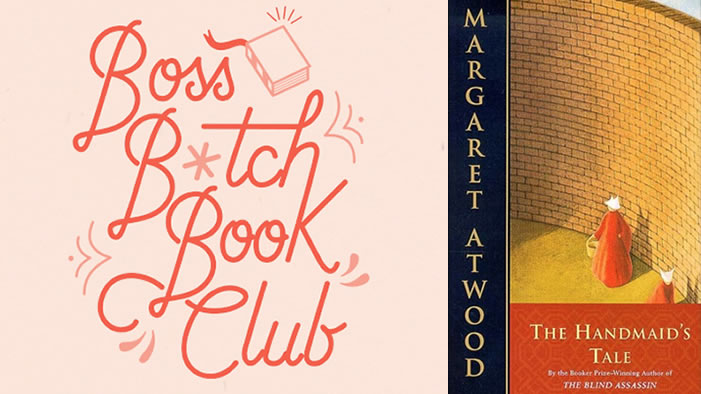Boss B*tch Book Club: The Handmaid’s Tale, Week Three

Margaret Atwood’s all about the slow reveal: last time, we finally got a visual (though a rather basic one) of our narrator, and, in this installment (our third!), we finally get the details of how women were disenfranchised—they were fired from their jobs (which were now illegal to have!), their credit card-equivalents were frozen, and all their savings were transferred to their husband’s accounts. Whew. Let’s just say it makes a cash-less society seem like a terrifying possibility.
I. “Instead, I am his.”
After all this happens, Offred is scared, miserable and yet, that night, her husband Luke tries to make love. She doesn’t want to, and she thinks: “He doesn’t mind it [i.e. that I’ve lost all my rights overnight] at all. Maybe even likes it. We are not each other’s anymore. Instead, I am his.” Why might Luke like that? What do you think Atwood/Offred is trying to say about men in this moment?
II. The Commander
Offred and the Command have started seeing each other on the regular; she’s become his mistress. They laugh, they play games, they read—or, rather, she reads and he watches her. He gives her hand lotion. They have conversations, some of which seem fairly sophisticated, about Gilead, the Time Before. At one point, Offred and the Commander are talking about the new society and, the Commander says, “Better never means better for everyone, he says. It always means worse, for some” (Ch. 32). Why does he say that? What does he mean?
More generally: How would you describe their relationship? How has it evolved? Do you think Offred is actually into—gasp—the Commander?
We talked last week about how the Ceremony is un-sexy sex—it’s mechanical, emotionless, more ore less* unconsensual. How has Offred’s relationship with the Commander changed the Ceremony?
*Because, in becoming a Handmaid, Offred knew what she was signing onto; however, she didn’t have a plethora of other opportunities.
III. Ofglen
So, until now, we haven’t even mentioned Ofglen. She’s barely seemed like a character; we, like Offred, too her for just another cog in the machine. Instead, she’s…something else. A member of a resistance movement. A sympathetic figure. Possibly a friend. What did you make of this new twist? Do you trust her?
After the initial delight of their newfound understanding, Ofglen says to Offred: “I thought you were a true believer…You were always so stinking pious (Ch. 27).” This is one of the first glimpses we get of how Offred’s perceived; did it surprise you to realize she seemed pious?
IV. Time
…moves like molasses in this book. Nothing to read, nothing to watch, always waiting to be called for. Don’t you wish you could just enter into the pages and somehow give Offred access to your mom’s Netflix password? A few questions below to get you thinking about the nature of time in the novel, how it’s working, and how we’re able to track it passing.
You’ve probably noticed that Atwood uses quotation marks only sporadically throughout the novel. What seems to dictate her decision to use/not use them?
What do you notice about the section headings? What’s the “action” that happens during the sections called NIGHT? How much time do you think has passed, in “real time,” at the Commander’s since the start of the novel?
V. Serena Joy
…is the villain of this book, true/false? I’m only kind of joking… What is her deal? More specifically: what’s her motivation to help get Offred—whom she seems to hate—pregnant? Why strike a bargain with her? It’s still one of the more mysterious facets of the book, and of that character, for me, so I’m hoping for some good answers.
Final question to mull over as you keep reading this week: Are the women in Gilead victims of circumstance? Or are they in any way responsible for their social status?
Your task: finish the book—and don’t forget the “Historical Notes”—they are a part of the novel!
Happy reading!












